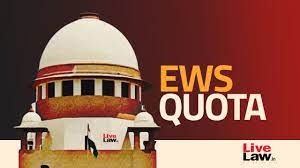Arbitrary and exclusionary: On EWS quota
Even if EWS quota is upheld, eligibility will have to be properly defined
A Constitution-Bench led by Chief Justice of India U.U. Lalit is now examining the validity of the 103rd Constitutional Amendment, which provides for 10% reservation to the economically weaker sections (EWS), excluding Other Backward Classes, Scheduled Castes and Scheduled Tribes who already have reservation in higher education institutions and government jobs. The Bench has finalised three issues for hearing — whether the amendment has breached the Constitution’s basic structure by permitting the state to make special provisions; whether it does so in relation to admissions to private unaided institutions and, lastly, if the exclusion of OBC/SC/ST communities from the scope of the quota tramples on the basic structure. These are valid questions and it could be argued that the legislation of the reservation in 2019 was done hastily without due diligence of the criteria adopted. For example, the setting of an annual family income of ₹8 lakh as a ceiling to determine if someone belongs to the EWS is clearly problematic. If available consumer expenditure surveys such as the NSSO report, ‘Key Indicators of Household Consumer Expenditure, 2011-12’, are relied on, a large chunk of the population will be eligible for reservations in the “below Rs. 8 lakh” EWS category and not just the truly deserving sections of the poor. A government-appointed committee submitted that this ceiling was reasonable, but it could not adequately explain how the income criterion was “ more stringent ” than the one for the OBC creamy layer. Also, the ₹8 lakh figure did not correspond to any data on the estimated number of EWS persons in the population with incomes related to it.
Petitioners have also argued that the net effect of the exclusion of Backward Classes and SC/ST aspirants from the EWS has been that they are now denied an opportunity to compete in the general category to the extent of 10%, in-effect, limiting the quota to the “forward classes”. This is a valid argument. Even if the Court agrees to maintain that reservations can be provided on economic basis — something that has been explicitly denied so-far with only social and educational backwardness being mentioned in the Constitution and reiterated in several judgments — excluding people of certain communities from this benefit despite their belonging to the EWS renders the legislation discriminatory. In recent recruitment and entrance examinations such as the UPSC and JEE, marks cut-offs for admissions were lower for the EWS quota than that of the OBCs. In-essence, if an income criterion for identifying the economically weaker sections has to be the basis, it must arrive at a clearly determined figure for the limit unlike the ₹8 lakh figure, and all sections of society, irrespective of caste, should be eligible to avail-of reservation under this category.
